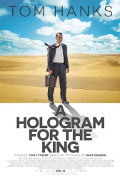
Directed by
Tom Tykwer
97 minutes
Rated M
Reviewed by
Chris Thompson

Hologram For The King, A
Synopsis: Struggling American business consultant Alan Clay (Tom Hanks) is sent by a huge American IT company to close a multi-million-dollar deal with the King of Saudi Arabia to supply all the IT infrastructure for a brand new coastal city including the deal’s centrepiece, a new three-dimensional holographic teleconferencing system. Once he arrives, though, Clay finds himself baffled by local customs and stymied by an infuriating bureaucracy. Fighting his way through a fog of self-doubt and soul-searching Clay’s only hope seems to be in an unlikely friendship with his designated driver, Yousef (Alexander Black), and an unexpected attraction to his doctor, Zahra (Sarita Choudhury).
The jolt from Tom Tykwer’s visually strong opening of a funny, surprising, hyper-real dream sequence with Clay performing his suburbanite take on the Talking Heads classic “Once In A Lifetime” to the image of him sitting in a plane, smack in the middle of cattle-class surrounded by passengers dressed in thobes and chanting an afternoon prayer perfectly embodies the dislocation that will keep him off-kilter for most of the film and immediately tells us that we’re in for something unusual.
There’s a touch of Willy Loman about Alan Clay in this whimsical but thoughtful film by the director of Run Lola Run (1999) and Cloud Atlas (2012). His life is a mess, his credibility is in doubt and this job is probably his last chance to get things back on track. Hanks is so good in these kinds of roles where he gets to bring his light, humorous, slightly incredulous tone to a character who is wrestling with his sense of own mortality and inner confusion not just about who he is, but about who he might be for the latter part of his life. His concern is not just for himself but for the way his less-than-successful marriage and spiralling career have impacted on his daughter Kit (Tracey Fairaway). In many ways, Alan’s life seems as hollow and insubstantial as the hologram he’s trying to sell.
Hanks’ strong performance is well matched by those around him. Black is hapless and endearing as the overly-familiar driver and his largely comic role still manages to find quite strikingly serious moments. Choudhury, too, is terrific and finds just the right amount of reserve in dealing with her attraction to this Westerner in a country where such things can have very dangerous consequences. The scene where they swim together in the sea is at once highly erotic and laced with tension from the lengths she must go to in order to prevent discovery. There’s also a great little cameo from Tom Skerritt as Alan’s disapproving father and an odd, very brief appearance by Ben Wishaw as the hologram.
The screenplay by the director is adapted from the bestselling novel by Dave Eggers and remains very faithful to the text. In fact, so much of the dialogue is lifted straight from the book that it’s a wonder that Tykwer doesn’t share his writing credit with Eggers in the way he shares his soundtrack credit with Johnny Klimek.
As the film nears its end, it shifts away from the absurdity of a world in which a King can simply decide to build a new metropolis in the middle of a desert to a more tender and heartfelt romance between Alan and Zahra. What surprises, though, is the abruptness of the film’s ending; slightly different from, but equally as abrupt as the book. On one level it left me happy with many tantalising possibilities for Alan’s future and, on another, left me feeling oddly dissatisfied with the lack of resolution. Nevertheless, the enjoyment of the film as a whole and of its marvellous performances, far outweighs any doubts about its ending.

Want more about this film?


Want something different?




